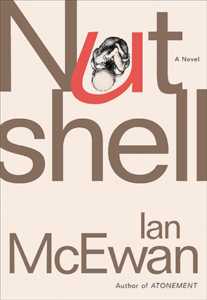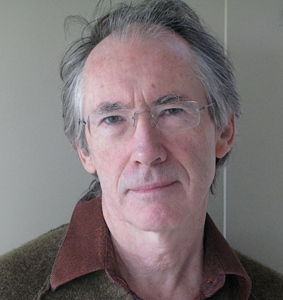Nutshell

BOOK BY IAN MCEWAN
NAN A. TALESE / DOUBLEDAY 2016
197 PP.; $24.95
THE PROTAGONIST and first-person chronicler of the British writer Ian McEwan’s new novel Nutshell is quite the worldly fellow: eloquent, erudite, cultured, an oenophile, a rueful student of humanity’s follies. He is also a fetus. (The conceit isn’t entirely original. John Barth’s “Night-Sea Journey,” published in his 1968 short story collection, Lost in the Funhouse, is about a sentient sperm.)
The other conceit in Nutshell is that its cast of characters includes contemporary versions of Hamlet (the fetus) and his mother, father, and uncle (Trudy, John, and Claude, respectively). Hamlet, I would maintain, is used to more telling effect in Ulysses and Rosenkrantz and Guildenstern are Dead. Nevertheless, Nutshell is beguiling, a jeu d’esprit that is insouciant without being frivolous. Its charm, I think, derives from the reader’s observing a very good novelist (and future Nobelist?) in an amused mood.
The plot is fragile, but it takes virtuoso skill to keep a slender story from becoming flimsy. The fetus (alas, he is unnamed, so I will sometimes refer to him as the “narrator”) is two weeks from parturition. Though he is eager to enter the world and experience its myriad sensations, he is not indifferent to the comforts provided by his mother Trudy’s womb, biological and otherwise. He delights, for instance, in her imbibing of various alcoholic beverages and has become quite the connoisseur (he particularly savors “a Sancerre, preferably from Chavignol”). He is most peeved, it seems, when Trudy and his Uncle Claude are copulating and Claude’s penis wends its way up his mother’s vagina like one of those massive earth-and-rock movers—its pulsating proximity much too proximate for our fetus’s comfort. (Also, he hates his uncle, who has displaced his father John and who he believes is an ignorant clown.)
The narrator overhears everything there is to hear in Trudy’s ambient milieu and has educated himself by absorbing the same BBC shows and podcasts that his mother listens to (this autodidact has acquired a remarkably sophisticated vocabulary, the equal of, mirabile dictu, Ian McEwan’s. The literal-minded won’t like this book.)
Trudy and Claude are living together in the London house owned by John, a failed poet and publisher of poets, a failure at almost everything, who lives elsewhere and pines for his rapidly receding wife. Little does he know that Trudy and Claude are plotting to do away with him. Why? For one thing, they intend to sell the house for a tidy fortune once they’ve murdered the hapless husband. For another, Trudy claims to despise John. There is also an intimation of a connection between the zealous coupling (it is obvious that the paramount bond sustaining this dangerous liaison is an erotic one) and the homicidal intrigue. But it isn’t clear what that connection is. Perhaps it takes a William Shakespeare or a Vladimir Nabokov or even a Norman Mailer to trace the nexus between libido and liquidation.
 While John is clueless about what’s transpiring as he lamely attempts to win Trudy back, his son is privy to all the details of the conspiracy and is racked with anguish—and ambivalence. He loves his mother but detests her malevolence. He loves his father but despairs at the evidence that John is indifferent to him (and he has to admit that his pop’s something of a dork). He finds Claude contemptible but is forced to acknowledge that his uncle possesses a certain low cunning.
While John is clueless about what’s transpiring as he lamely attempts to win Trudy back, his son is privy to all the details of the conspiracy and is racked with anguish—and ambivalence. He loves his mother but detests her malevolence. He loves his father but despairs at the evidence that John is indifferent to him (and he has to admit that his pop’s something of a dork). He finds Claude contemptible but is forced to acknowledge that his uncle possesses a certain low cunning.
As an insightful—and pragmatic—moralist, the baby-to-be ponders whether he should do something to thwart the wicked scheme and what he could do: “I’m troubled. I’m hearing pillow talk of deadly intent and I’m terrified by what awaits me, by what might draw me in.” (The time might not be out of joint and he might not have been born yet, but he considers how to set things right.) The narrator is also inveterately inquisitive, so he can’t help sifting through the murder machinations to determine whether they are viable, clever enough.
As the murder deliberations proceed apace, alibis and equipment are vetted and adopted. “‘Antifreeze [says Claude] contains ethylene glycol, rather good stuff. I treated a neighbor’s dog with it once…. No colour, no smell, pleasant taste, rather sweet…. Wrecks the kidneys, excruciating pain. Tiny sharp crystals slice the cells apart. He’ll stagger and slur like a drunk, but no smell of alcohol. Nausea, vomiting, hyperventilation, seizures, heart attack, coma, kidney failure. Curtains.’” The narrator relays Trudy’s inquiry: “Leaves a trace?” and the response she’s given: “Everything leaves a trace. You have to consider the advantages.”
Trudy has second thoughts, even feels a modicum of guilt—but the foul-play ploys take on a life of their own. I will now bring down the curtain, because to disclose any more would be, good reader, very unfair to you.
Truly, Nutshell is a well-wrought book: no frills, an engaging finesse. Contemplating its style, as it turns out, has prompted me to ponder an aspect of American fiction. Since those golden days of yore—the James Joyce-Ernest Hemingway era—many American writers have shaped their verbal gifts into swagger. Sometimes this works: Portnoy’s Complaint, by Philip Roth, Frederick Exley’s A Fan’s Notes, Robert Coover’s The Public Burning, Thomas Berger’s Who is Teddy Villanova? Often it hasn’t: William Faulkner, Donald Barthelme, much of John Barth, ad infinitum. (Yes, Faulkner. He and his readers would have been better off if he had never heard of Joyce.) McEwan doesn’t show off, he doesn’t overdo the literary pyrotechnics. (And while real writers sweat blood, he doesn’t grab the reader by the lapels and flaunt his toil, like certain American writers.) And yet, his prose is burnished, lambent. Nutshell, indeed, is a celebration of language. The fetus only learns through overheard speech and he can only communicate by talking. Perforce, he revels in words—cannily chosen words. (I believe Jonathan Swift said that good writing is, “The right words in the right order.” So true!) “Speaking’s just a form of thinking,” the narrator says. The eminent cognitive scientist and linguist Steven Pinker (in The Language Instinct) says this isn’t so. But who would deny a writer, especially this writer, that belief?
We live in crazily polarized, internecine times. Watch: some ruthless group will cite Nutshell in an antiabortion tract.
